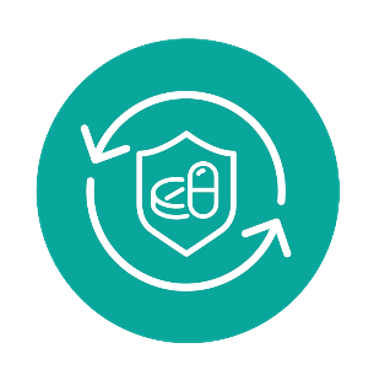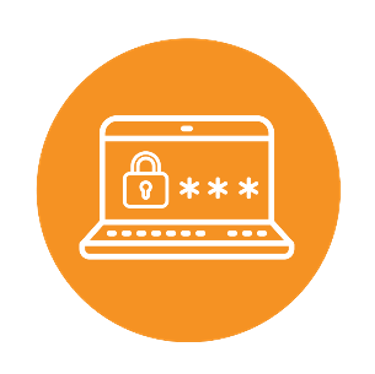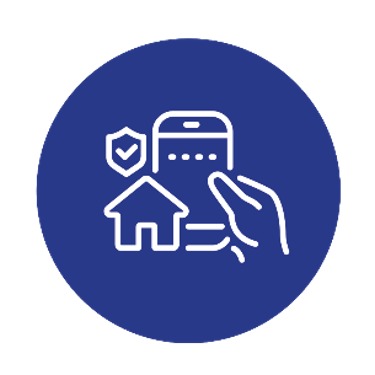Digital technology is bringing about exciting changes across all areas of life, including in health and social care.
Health and care records that were previously kept on paper are now becoming electronic. We can see our own GP records and order repeat prescriptions online. And different organisations that provide our health and care can communicate with each other much more easily, improving our care and making it safer.

Data Security and Protection Toolkit (DSPT)
70% completion

Digital Social Care Record (DSCR)
used by 80% of care homes

NHSMail
123 active accounts
We’re supporting our social care providers to take advantage of all this, so they can make care the best it can possibly be for people. Below, you can read about some of the ways we’re doing this.
What residents say:
“I think staff being able to be connected with the GP surgery through SystmOne and Proxy Access is great. This means that both the seniors and myself are informed when my Mum has an appointment. Everybody is kept in the loop, and it works like a triangle.”- KS, daughter of a care home resident and NHS nurse
Keeping people’s information safe
Every care service holds information about the people it supports. We’re working with care providers in Bedfordshire, Luton and Milton Keynes (BLMK) to make sure services are storing and using this information securely and that it’s properly protected. This is a legal requirement and it’s also vital for keeping people safe.
The Data Security and Protection Toolkit (DSPT) is a really helpful yearly self assessment that shows health and care organisations what they need to do to keep people’s information safe and protect their organisation from risk.
A national and local programme called Better Security, Better Care is providing support to social care providers, designed to improve data protection and cyber security in the care sector. An independent review of the programme has demonstrated excellent return on investment, with an estimated £2.71 saved in terms of reduced costs and disruption caused by data breaches and cyber attacks, for every £1 spent on the Better Security, Better Care programme – read more on Bedfordshire Care Group’s website.
BLMK is offering free, expert advice on data protection arrangements to care homes, home care agencies, supported living and other care services for residents across the area. More details can be found on the DSPT website.
What our care services say:
“Now we have the DSPT, we have been able to demonstrate to the Care Quality Commission that we can securely store and protect patient data. This has helped us to strengthen our IT system and begin our digitalisation journey.” – Anda Marin, General Manager at Burlington Hall Care Home (read Burlington Hall case study)
Introducing electronic social care records
Every care provider registered with the health and social care regulator, the Care Quality Commission (CQC), is being encouraged to improve the quality of its care by going digital. Funding has been available to make this happen in BLMK.
Changing from paper records to a digital social care record (DSCR) in care organisations can have a huge effect on the safety of care, as well as how well care works for those receiving it. It can also save care organisations time and money.
In BLMK, we supported more than 80% of our care organisations to make the move from paper-based systems to digital records ahead of schedule (read the full article).
What our care services say:
“I’m a big advocate for DSCR for safety, accountability and compliance reasons. We have better control in terms of monitoring and auditing… It ensures better communication… The alert system is fantastic – if there’s something we need to be aware of, we know about it immediately.” – Sembia Johnson, Registered Manager, M&C Home Support (read M&C Home Support case study)
“We know within an hour if there’s an incident where someone hasn’t had their medication. It’s also easier to track falls, see trends, and carry out lessons learnt reviews and root cause analysis. You can provide a safer service and know what’s happening in the community – I can’t underline enough the importance of that.” – Jason Drury, Managing Director at Prime Care Support (read Prime Care case study)
“The care system flows a lot better because of the digital notes. The person-centred system allows for a more rounded picture of care, which supports with the day-to-day running of the nursing home. I can’t imagine going back to a paper system.” – Heidi Perret, Deputy Manager of Peter’s Place (read Peter’s Place case study)
“Digital Social Care Records supported the staff to have better quality time with our residents. They have all the information in one place, and they can refer to it at any point of the day. For example when the staff take residents out in the community, it’s easy for them to record the activities straight away, and information won’t be lost or missed.” – Bouchra Izzar, Registered Manager of Houghton Regis Community Care Scheme (read DSCR case study)
“It’s safer, it’s more robust and we wouldn’t go back any other way now. You’ve got more time because you’re quicker at actually recording, you have more time for the people that you’re supporting. So it’s a win-win all round.” – Chetna Satra, Registered Manager of The Limes (read DSCR case study)
Online ordering increases safety in care homes
Ordering repeat medicines for people living in care homes is now safer, easier and quicker in homes that have a direct link to their residents’ GP records.
Instead of working with paper prescriptions, care homes can log in to a GP’s online system on a resident’s behalf, ordering repeat prescriptions in the same way patients more generally can do themselves.
We have developed Proxy Access to help our residents who might be struggling with ordering medication or being able to look at useful information on their records they would normally be able to see. Proxy Access is secure and can only be used with the correct approval.
It means, for example, care homes can order medications at any time of day or night, leaving them free to concentrate on residents when most needed. They can also leave notes for the GP on the system, improving communication about the resident’s healthcare needs.
Importantly, as online ordering is based on the up-to-date details in the GP record, it’s more accurate. Medicines that are no longer needed can be avoided, making it safer for residents.
GPs and their practice staff, meanwhile, save time and effort as they no longer have to deal with paper prescriptions. And care homes using the online system are able to show health and care regulator the CQC how they’ve increased resident safety and information security – important in helping them meet legal and ratings requirements.
Care homes setting up Proxy Access must first have a secure email system – preferably NHSmail.
What our care services say:
Anda Marin, General Manager of Burlington Hall Care Home has praised Proxy Access for being easy to use. It has increased communication with GPs regarding repeat prescriptions, allows staff to see if there has been a medication review – ensuring repeat ordering is safer, more efficient and cost effective. Staff can now also access the digital records and order medications at any time of the day. Read Burlington Hall case study.
“Proxy Access makes the process of ordering repeat medication on behalf of the resident hassle-free. There are fewer risks and issues associated with the re-ordering of medication, and it’s given us more flexibility because we can order medication at any time or day.” – Kamal Benipal, Registered Manager of Belle Vue Care Home
“It’s increased productivity and made things much easier for everybody. It’s increased communication and relationships with the GP surgery, and it reduces time wastage, medication errors and it staff stress levels. It’s a much more person-centred approach than it ever used to be, and it makes the residents feel much more involved in their care. If you care about the residents, it’s definitely the thing to have.” – Claire Croucher, Registered Manager of Precious Homes
What GP practice staff say:
“It’s helped to cut down the time that we’re having to contact each other, because you can see what you’ve ordered and when it has been dispensed.” – Laura Warner, Senior Care Coordinator at the De Parys Group
“If there are any issues we are made aware, but on the whole our care coordinators tell us it’s been a great experience so far for them, and we’ve had very good feedback from the people directly involved. I do feel it makes a lot of things more seamless and trouble-free – especially reducing the time the GP has to get involved in day-to-day issues.” – Dr Harsh Kak, GP Partner at the De Parys Group
“It opens the conversation about your ordering processes – things that you could do better, things the care home could do better… So just by having that conversation, it naturally helps to improve things.” – Kirsten Frost, Practice Manager and Pharmacy Technician at London Road Surgery
Ensuring residents’ information is sent safely and securely
Wide-scale adoption of NHS.net mail accounts fosters smoother and more secure communication across the healthcare network – such as care homes, GP practices and hospitals. This is the preferred system for Proxy Access and for hospitals to safely share patient information with social care.
NHSmail is available to all CQC-registered care providers who have achieved ‘Approaching Standards’ on the Data Security and Protection Toolkit.
What our care services say:
“Before NHSmail, my staff would have been required to visit practices to access resident information – taking valuable time away from care provision.” – Anda Marin, General Manager at Burlington Hall Care Home (read Burlington Hall case study)
You can find out more about what we’re doing by clicking on each of the links below. For more information on the programme, or any of our projects, please email the team.


